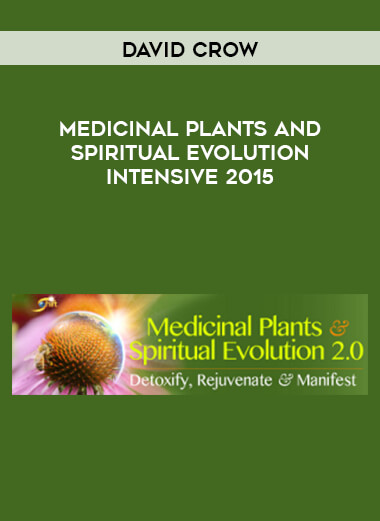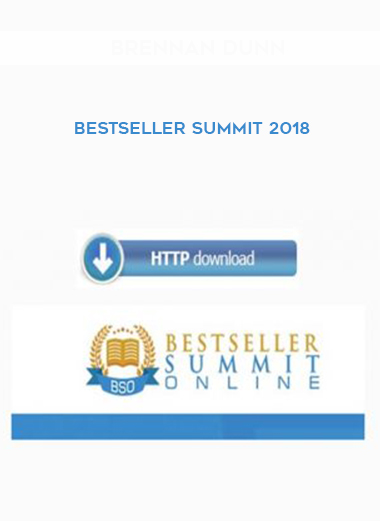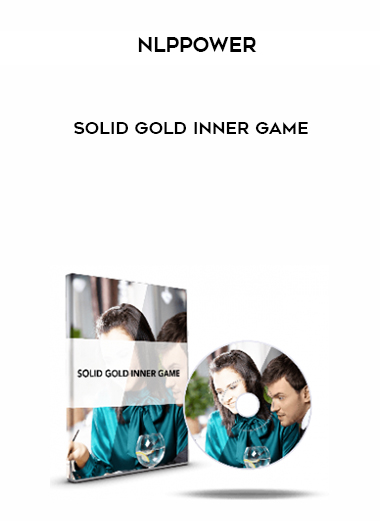David Crow – Medicinal Plants and Spiritual Evolution Intensive 2015
 Salepage : David Crow – Medicinal Plants and Spiritual Evolution Intensive 2015
Salepage : David Crow – Medicinal Plants and Spiritual Evolution Intensive 2015
Arichive : David Crow – Medicinal Plants and Spiritual Evolution Intensive 2015
For example, during this 6-month program, you’ll:
Use common herbs to treat ailments in a less invasive and non-toxic way.
Learn how to use spices, teas, elixirs and aromatic culinary herbs to strengthen your digestion, respiration and immune system.
Develop daily and periodic detoxification practices based on essential oils, spiritual practices and natural therapies.
Receive insights into principles of rejuvenation and energy rebalancing in Ayurvedic and Chinese medicine.
Understand adaptogens and the therapeutic applications of tonifying roots.
Study the 4 levels of using herbs in Tibetan and Ayurvedic medicine, from medical to spiritual.
Apply the powerful anti-aging, anti-inflammatory and immune-modulating properties of reishi, the “mushroom of immortality.”
Learn which plants support mental function, enhance memory and improve concentration, as well as prevent neurodegeneration.
Develop new ways to work with energy, consciousness and healing.
Learn how medicinal plants can specifically be used to develop awareness of our unity with the elements of the cosmos.
Discover the differences between the molecular intelligence of medicinal plants and pharmaceutical drugs.
Receive clear instructions for how to combine meditation and herbal therapies for effective pain management.
Understand stress, anxiety and depression according to Ayurvedic and Chinese medicine, and how to apply plant remedies in a proper way that rebalances emotions.
Learn how to foster deep, rejuvenating sleep through herbs.
Discover classical meditation methods, such as Vipassana, for cultivating ecological spirituality.
Apply ancient sacred scents such as frankincense, myrrh and sandalwood in a way that opens your spiritual awareness.
Learn how to use major herbs and essential oils with anti-aging properties.
Apply plants to issues with sexuality and erotic fulfillment.
Develop discernment of the internal healer – the awareness about what to eat, what to avoid and which products to use.
Modules 1 & 2: Humble Healers
Medicinal Plants for Digestive & Respiratory Power (July 14 & 21)
week1.jpg
There are many simple herbs and spices that have highly effective therapeutic powers for preventing and treating common digestive and respiratory conditions. Many of these are widely available as fresh culinary herbs, and many can be easily grown in gardens and windowsills.
These humble healers have well-documented antimicrobial, anti-oxidant, antispasmotic, anti-inflammatory and immune enhancing powers, but are mild and safe to consume on a daily basis by almost everyone. Knowing how to use these medicinal plants helps individuals and families to medically empower themselves by increasing overall well being and treating countless common ailments without needing to resort to stronger and more toxic medications.
In this module, you’ll learn:
Principles of strengthening digestion in Ayurvedic and Chinese medicine
Common digestive problems, and how to improve them with herbs
Principles of respiratory health in Chinese and Ayurvedic medicine
How to treat common respiratory problems with herbs and essential oils
The relationship between digestive and respiratory health
How aromatic culinary herbs can assist in digestive problems and clear the lungs
Important spices for daily immune enhancement
The most effective herbal teas, syrups and elixirs
Sources and reviews of products
Modules 3 & 4: Botanical Purification Medicinal Plants for Detoxification of Body & Mind (July 28 & August 11)
week2.jpg
Plants detoxify the biosphere of the Earth, and many medicinal plants are highly effective for detoxifying the inner biosphere of the human body – something that pharmaceutical drugs cannot do. As the levels of environmental toxicity rise, associated health challenges are multiplying and increasing in seriousness, making the purifying powers of plants even more valuable and necessary. Detoxification, whether from environmental poisons or from toxic addictions, has profound implications for removing the obstacles to health, happiness and fulfillment, and plays an important role in our individual and collective spiritual evolution.
In this module, you’ll learn:
Concepts of toxicity and detoxification in Ayurvedic and Chinese medicine
A deeper perspective on trauma, addiction, detoxification and spiritual evolution
How to apply spiritual detoxification practices from traditional cultures
Principles and guidelines for safe and effective detoxification
How to identify types of toxins, their sources and their effects on the body
About microbial infections and detoxification
How to use herbs, essential oils, spiritual practices and natural therapies for detoxification and withdrawal
Simple practices for nutrition, kitchen medicine and daily detox
Module 5: The Path of Rejuvenation
Herbs & Therapies for Nourishing Vitality and Strengthening Immunity (August 18)
week3.jpg
Just as pharmaceutical drugs cannot detoxify the increasing burden of toxicity in the body, they are also incapable of replenishing the body’s nutrients and increasing true vitality. Classical medical systems such as Ayurveda and Chinese medicine offer sophisticated and systematic approaches for rejuvenating the body and mind. Using nurturing therapies and medicinal plants rich in nutritive compounds, we can restore strong immunity, overcome fatigue and increase the length, quality and enjoyment of life.
In this module, you’ll learn about:
Soma, ojas, rasayana and principles of rejuvenation in Ayurvedic and Chinese medicine
Rasayana preparations for nourishing the body and restoring vitality
Integrating meditation and spiritual practices with botanical therapies
Rejuvenative foods and foods to avoid
How to integrate spiritual practices into rejuvenation therapy
Module 6: Roots of Power
Adaptogenic Roots for Vitality & Longevity
(August 25)
week4.jpg
At the center of rejuvenation therapies we find medicinal plants with adaptogenic powers. The roots of these plants offer unique restorative powers that balance and strengthen the immune, endocrine and neurological systems. While generally safe, nontoxic and easy to use, the use of these roots and the preparations made from them requires the knowledge of who, when and how to use them for maximum benefits.
You’ll learn:
The spiritual attributes and therapeutic applications of tonifying roots
When use to adaptogenic roots and when to avoid
About therapeutic actions and health benefits of adaptogens
Tonic preparations in Ayurvedic and Chinese medicine
Sources and reviews of herbal products
Module 7: The Mushroom of Immortality
Medicinal Fungi (September 15)
week5.jpg
Since antiquity, medicinal fungi have held a highly esteemed place in Chinese medicine. Reputed to support spiritual practices, give long life and enhance wisdom, these medicines have been considered elixirs of the sages that can benefit everyone. Modern research confirms the powerful anti-aging, anti-inflammatory and immune-modulating properties of these fungi, while modern production and extracting methods now offer a wide range of excellent preparations and products to support health and well-being.
In this module, you’ll learn:
The history and healing powers of reishi, cordiceps and other important species
Biological unity: the outer and inner biological functions of fungi
The anti-inflammatory, immuno-modulating and longevity powers of reishi
The immune, vitality and endurance enhancing powers of cordiceps
Major therapeutic actions and health uses of medicinal fungi
Individual constitutions, potential side effects and interactions
About the best preparation methods and products
Module 8: Clear Mind
Medicinal Plants for Enhancing Cognitive Function (September 22)
week6.jpg
Cognitive function is the foundation for all success and accomplishment, whether it is our work in the world or our inner spiritual development. Stress, nutrient deficiencies, environmental toxins, medications and normal aging are only a few of the many influences that weaken and damage healthy brain function. Throughout time, plants that support mental functions, enhance memory and improve concentration have been regarded as having a unique and special place in the botanical pharmacopeia for supporting mental well-being and nourishing spiritual evolution.
In this module, you’ll learn:
Concepts of mind, concentration, memory and cognitive function in yoga, Tantra, Ayurveda and Chinese medicine
Modern understanding of cognitive decline and neurodegeneration
Primary cognitive disorders and causative factors
Major herbs and essential oils that support concentration and memory
How to integrate meditation practices into herbal therapy for enhanced cognitive and brain function
The benefits and drawback of stimulants
Modules 9 & 10: Compassionate Healers
Medicinal Plants for Pacifying Pain and Inflammation (September 29 & October 13)
week7.jpg
Pain and inflammation are the great obstacles to fulfilling the aims of life. When one has been freed from pain by the powers of medicinal plants, a profound appreciation for the benevolence and healing compassion of nature’s remedies arises. The pharmacopeia of pain relieving and anti-inflammatory herbs is vast and requires knowledge to use correctly, but with a few simple, safe and easily available species, even complex and chronic medical conditions can be benefitted and resolved.
In this module, you’ll learn:
The connection between pain and spiritual evolution
Types of pain according to Chinese and Ayurvedic medicine
c
Important but little known herbs for pain and inflammation
Integrated botanical therapies for menstrual, digestive and arthritic pain, headaches and fibromyalgia
Herbal preparations including medicated oils, liniments, plaster and other methods
How to combine meditation and herbal therapies for pain management
Potential herb/drug interactions
Sources and reviews of products
Modules 11 & 12: The Journey to Happiness
Medicinal Plants for Counteracting Stress, Anxiety
& Depression (October 20 & 27)
week8.jpg
We live in an age of widespread unhappiness, caused by a multitude of social, economic, environmental and spiritual factors. Many of these forms of suffering require an integrated and multidisciplinary approach to fully resolve, but medicinal plants offer strong support to help counteract stress, calm the mind and emotions and uplift moods. When integrated with meditation and other practices, herbal medicine can transform the suffering of the mind into a path of spiritual evolution.
In this module, you’ll learn:
Types of anxiety and depression according to Ayurvedic and Chinese medicine
Concepts of Shen disturbances in Chinese medicine and Prana Vata in Ayurveda
Concepts of emotional disturbances and psychological disorders from indigenous cultures and shamanic traditions
About stress, anxiety, depression and spiritual evolution
How to rebalance endocrine and neurological functions
Uses and misuses of antidepressant herbs such as St. John’s wort, kava kava and others
Important but little-known herbs for depression and anxiety
Uses of important essential oils for antidepressant and anxiolytic functions
How to combine spiritual practices and herbal therapies for counteracting stress, anxiety and depression
Module 13: Ambassadors of Peace
Medicinal Plants for Restful Sleep (November 10)
week9.jpg
Sleep is essential for the healing of every illness. There are many sleep disorders that affect people of different ages and constitutions, but they can all be benefitted to various degrees by the plants that bring peace to the body, mind and emotions. Whether it is balancing blood sugar, nourishing exhausted adrenal glands, relaxing tense muscles or restoring a tired nervous system, many different plants can be used as allies to produce deep rejuvenating sleep.
In this module, you’ll learn:
The connection between sleep, dreams and spiritual evolution
The primary types of insomnia and sleep disorders, and how to treat them
The source of sleep disorders according to Chinese and Ayurvedic medicine
Approaches to calming the spirit and pacifying Vata
Categories of nervine herbs according to body systems
The right use and misuse of relaxant herbs
Unique and little-known herbs and essential oils for insomnia and restlessness
Which dietary factors influence sleep
How to combine meditation and spiritual practices with herbal treatment of sleep disorders
Adjunct therapies for sleep
Reviews and sources for herbal products
Module 14: Soma
Herbs, Elixirs and Therapies for Deepening Contemplative & Yogic Practices (November 17)
week10.jpg
The highest goal of classical Asian medical systems is a long healthy life leading to spiritual illumination and fulfillment. Traditionally, many medicinal plants and therapies have been used for supporting meditative and yogic practices: some feed the brain and enhance the nutrient essences of ojas and soma, some warm the muscles and circulation and protect from injury, some sharpen the mind and concentration, some produce euphoric relaxation. These therapeutic powers are not only beneficial for those engaged in contemplative endeavors, but also enhance the well-being of everyone.
In this module, you’ll learn:
What “soma” is and the relationship with meditation
How to use sacred scents for ritual and ceremony
Which essential oils enhance pranayama
About attars for marmas and the process of anointing
Herbal care of muscles and joints for yoga practitioners
Important herbs for supporting the respiratory and neurological systems
About nasyas: nasal medications for calming and focusing the mind
Unique herbs and preparations used with meditation, mantra and yoga
About dietary guidelines
Correlations between chakras, herbs and essential oils
Sources and reviews of herbal products
Liniments, salves and medicated oils for muscles and joints
Module 15: Sacred Scents
The Spiritual and Medical Uses of Precious Resins & Sacred Trees (November 24)
week11.jpg
Aromatic plants have been used by humans since time immemorial, as fragrant offerings in rituals and ceremonies and medicines for the mind and body. This group of plants rightly deserves the title of “sacred scents,” so widespread and ancient is their use for spiritual endeavors. In addition to being found throughout the world in temples, mosques, churches, pagodas and holy places of every religion, they are also great botanical medicines, known to both traditional healers and now discovered by modern scientific research. Their use in our homes can play an important role in preventing illness, enhancing mental and emotional well-being and supporting our spiritual practices.
In this module, you’ll learn about:
Frankincense
– Its uses for ritual and ceremony
– Mood enhancing effects on consciousness
– Anti-inflammatory powers of resin and oils
– Boswelic acids and autoimmune inflammation
– Its applications for skin care
– Frankincense and myrrh in traditional liniments for injury
– Frankincense gum for dental care
Myrrh
– Antiseptic powers for respiratory and oral infections
– Recipes for dental care
Sandalwood
– Sacred anointing oil for meditation
– Skin care uses
– Meditation incense recipes
Agarwood
– Meditation incense
– Antidepressant and antianxiety effects
– Spiritual perfume
– The wish-fulfilling powers of the sacred scents
Modules 16 & 17: Botanical Elders
Medicinal Plants for Aging Gracefully
(December 8 & 15)
week12.jpg
Aging brings a multitude of physiological changes, many of them unpleasant. As we get older, medicinal plants play an increasingly important role in slowing the aging process and counteracting symptoms without toxic medications; in many cases it is possible to reverse chronic conditions we did not have the knowledge, resources or ability to resolve earlier in life. As we develop a deeper relationship with healing plants in our elder years, we find a new appreciation and sensitivity to the healing powers of nature that they contain, leading us to our own unique understanding of ecological spirituality.
In this module, you’ll learn:
More about aging and spiritual evolution
Concepts of aging in Chinese and Ayurvedic medicine
Modern understanding of physiological changes and challenges of aging
Major herbs and essential oils for anti-oxidant and anti-aging powers
Herbal protocols for comfortable menopause, prostate health, bone, joint and dental health
Sources and reviews of products
Module 18: Botanica Erotica
Medicinal Plants for Enhancing Romance & Intimacy (December 22)
week13.jpg
Diminishment of libido and disturbances of sexual functions are sources of suffering and obstacles to intimacy and expression of romantic passions. Classical medical systems as Ayurveda and Chinese medicine place great emphasis on protecting and rejuvenating sexual vitality, not only for romantic and erotic fulfillment, but also for general health and well-being. Medicinal plants offer many forms of nourishment that revitalize, energize and enhance sexual functions without unwanted side effects, but knowledge and understanding of the plants and the spiritual dimensions of sexuality are needed to avoid unwanted side effects.
In this module, you’ll learn:
Shukra and jing: concepts of essence in Ayurvedic and Chinese medicine
How to support glandular health
About vajikarana and aphrodisiac therapies
How to nourish the blood
Insights on male and female tonics and elixirs
About exotic perfumes and intoxicating aromas
Uses and misuses of aphrodisiac herbs
Sources and reviews of products
Meditation and spiritual practices for enhancing romance and intimacy…






























Reviews
There are no reviews yet.